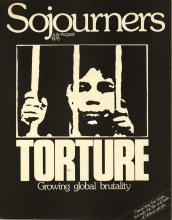Pat Hostetter Martin, author of this article, went to Vietnam first in 1966 as a volunteer for the Mennonite Central Committee. She and her husband, Earl, returned to Vietnam in 1974. An account of their personal experiences up to and after the fall of the Thieu government appeared in Sojourners January 1976 interview with them.
On the morning of October 20, 1973, a young Vietnamese woman Dang Thi Hien, left her Saigon home to shop at a nearby market. As she was buying a bouquet of flowers for the ceremony of remembrance (the 100th day since her father’s death), a casual acquaintance stopped to greet her. As they stood chatting, four men in civilian clothes approached them and asked for Hien’s identification papers. Upon examining them, the men grabbed her wrists and started to drag her out of the market, claiming that her papers were counterfeit. Hien was taken by taxi to the local police station where she was searched. Then, without further explanation, she was taken to the interrogation center of a province west of Saigon.
At the interrogation center Hien was charged with acting as a liaison agent for the National Liberation Front. Hien replied, “I am not a cadre, I’m an ordinary citizen. I have nothing to declare.”
She was informed that her friend, the woman decoy who had spoken to her in the market that morning, had implicated her in a “Viet Cong communications ring,” and they demanded that she reveal her contacts and her activities. Hien declined to confess to anything. To reinforce the earnestness of their demands, five or six men started beating Hien with their fists and with wooden clubs. After violently beating and kicking her face, back, chest and stomach, they again demanded a confession. When Hien again declared her innocence, they attached electrodes to her fingers and gave her repeated electric shocks of higher and higher voltage.
Read the Full Article

